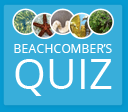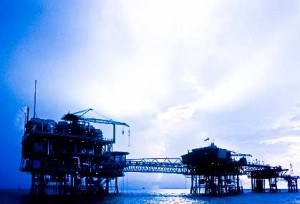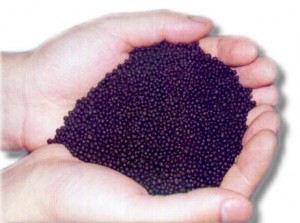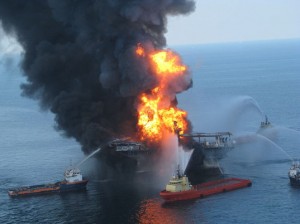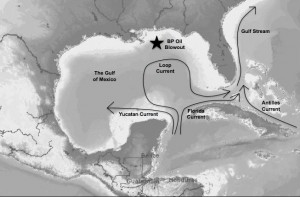- Crude oil, also known as petroleum, is a mixture of naturally occurring hydrocarbons – compounds that contain only carbon and hydrogen.
- Crude oil is found deep beneath the Earth’s surface and was formed from plants and animals that lived millions of years ago. Their decaying remains were covered by sand and silt layers. The heat and pressure created by the layers turned the organic remains into crude oil.
- Because crude oil consists of the remains of organisms preserved in the rocks beneath Earth’s surface over time, it is classified as a fossil fuel.
- Crude oil is refined, or processed, into products like diesel and gasoline. These substances are burned to produce energy.
- About 40% of all energy consumed in the United States comes from crude oil.
- Petroleum is also used in the production of many chemical products, including pharmaceuticals (medicine), fertilizers, pesticides, and plastics.
- Crude oil accumulates between underground rock layers over time. An area where crude oil naturally collects is called an oil reservoir.
- To reach crude oil in reservoirs deep underground, we must drill wells. Oil drilling is the process of puncturing the earth’s surface and drilling through rock layers to extract fossil fuels.
- Oil drilling has been in practice since the 1800s. It is usually safe and effective, but human error and construction failure can lead to accidents, including oil spills.
- An oil spill is the release of liquid petroleum into the environment due to human activity. It is a form of pollution.
- Oil spills can occur on land or in water.
- The term marine oil spill describes any situation where oil is released into the ocean or coastal waters.
- A number of well-known marine oil spills have occurred throughout history.
- In 1989, the Exxon-Valdez oil spill spewed 11 million gallons of crude oil into Alaska’s Prince William Sound.
- In 1991, about 400 million gallons of crude oil were purposely spewed into the Persian Gulf at the beginning of the Gulf War to prevent American soldiers from landing.
- The BP Deepwater Horizon oil spill began on April 20,2010 in the Gulf of Mexico when an oil rig exploded. Crude oil gushed into the Gulf for 86 days, spilling over 5 million barrels (approximately 210 million gallons) of oil into the Gulf of Mexico.
- Marine oil spills can cause serious, long-lasting environmental and human health problems.
- Wildlife often becomes oiled, or coated in oil. Oiled animals’ survival is impaired. For example, oiled birds struggle to feed and fly, while marine mammals and fish have trouble swimming and breathing.
- Many organisms die after ingesting toxic oil while feeding.
- Oil coats the seagrass beds and coral reefs, killing the organisms that provide important habitat for thousands of species.
- Many economically and recreationally valuable Gulf fisheries populations were damaged by the Deepwater Horizon oil spill. Coastal communities will continue to experience negative economic consequences for months, or even years, after the accident.
- Oil is toxic and can cause human health problems. People often develop respiratory disease and skin conditions after exposure to crude oil.
- Marine oil spills can never be completely cleaned up because oil spreads rapidly as it is carried by currents and stirred up by wind.
- There are a few ways to contain and lessen the impact of major oil spills, but each method has associated costs and benefits.
- In the Deep Water Horizon spill, record quantities of dispersants were used to clean up the oil. As a result, the oil was mixed throughout the water column.
- As oil treated with dispersant settles to the sea floor, bottom feeders consume it accidentally. When larger predators eat these small organisms, crude oil accumulates in the food chain, causing toxicity in many marine species.
- At this time, the extent of environmental and human health impacts from the Deepwater Horizon Oil Spill remain unknown.
Practice Good Stewardship
- Reduce your oil consumption: If you’re going somewhere nearby, ask permission to walk or bike there instead of getting a ride from an adult. This reduces the amount of crude oil necessary to fuel the vehicle.
Review Questions
- What is crude oil?
- List at least three common uses of crude oil in the United States.
- What is the name of the oil spill that began on April 20, 2010 in the Gulf of Mexico?
- List three negative effects of oil spills on the environment.
- What are dispersants? Explain the negative effects that dispersants may have on the environment.
Glossary
Bioremediation: A process in which hydrocarbon-consuming bacteria are used to break down oil into water and carbon dioxide.
Booms: Large floating barriers that contain oil and prevent it from spreading.
Burning: A process in which oil is burned off the surface of the water.
Crude Oil: A mixture of naturally occurring hydrocarbons found deep underground; generated naturally from decaying plant and animal material exposed to heat and pressure over millions of years.
Current: The steady flow of water in a prevailing direction.
Dispersants: Chemicals used to break oil into small droplets, which are then scattered throughout the water column.
Fossil Fuel: Fuel consisting of the remains of organisms preserved in rocks beneath the Earth’s surface over millions of years; includes petroleum, coal, and natural gas.
Hydrocarbons: Compounds that contain only carbon and hydrogen.
Hypoxic Zone (Dead Zone): Low-oxygen areas in the world’s oceans where most organisms struggle to survive.
Marine Oil Spill: Any situation where oil is released by human activity into the ocean or coastal waters.
Oil Drilling: The process of puncturing the earth’s surface and rock layers to extract fossil fuels.
Oiled: The term used to describe wildlife that has been coated in oil.
Oil Reservoir: An area where crude oil naturally collects.
Oil Spill: The release of liquid petroleum into the environment due to human activity.
Petroleum: See crude oil.
Pollution: The undesirable state of the natural environment being contaminated with harmful substances as a consequence of human activities.
Refined Oil: Crude oil that has been processed into other products, including diesel and gasoline.
Skimming: The process of skimming oil off the surface of the water using specially equipped boats.
Sorbents: Special absorbent pads used to soak up oil from the surface of the water.
Vacuuming: The process of sucking up oil and water, then separating the two substances using a centrifuge.
